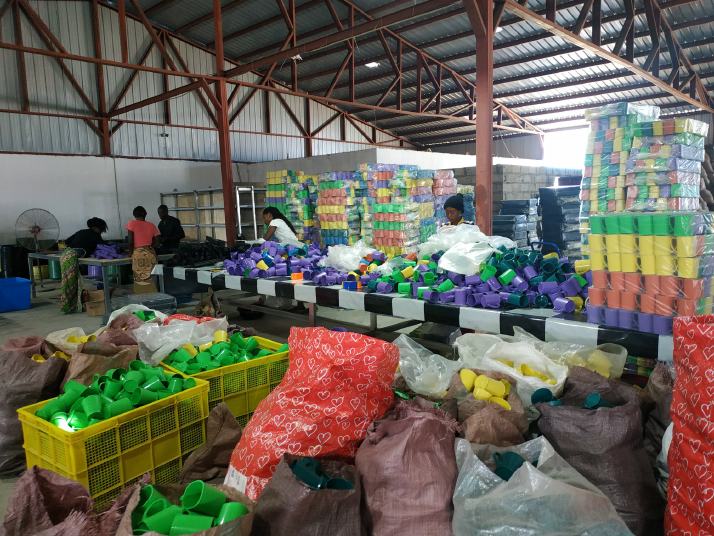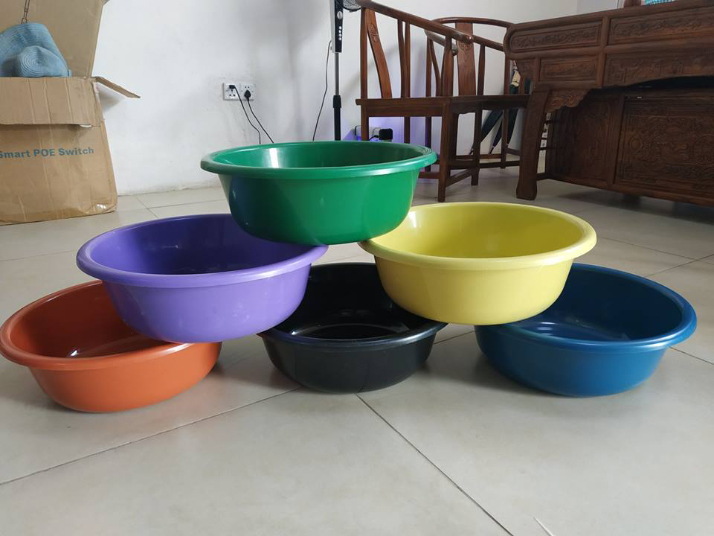|
||||||||||
| Home Nation World Business Opinion Lifestyle ChinAfrica Multimedia Columnists Documents Special Reports |
|
||||||||||
| Home Nation World Business Opinion Lifestyle ChinAfrica Multimedia Columnists Documents Special Reports |
| ChinAfrica |
| Turning Trash Into Treasure |
| A Chinese recycling plant in Zambia is creating jobs while protecting the environment |
| By Derrick Silimina | VOL.11 September ·2019-09-12 |

Workers sort out various plastic wares in Hongsen recycling plant (DERRICK SILIMINA)
Monica Banda wakes up every morning and leaves her house in Makeni Villa Township to travel to Chunga dumpsite in Zambia's capital Lusaka. There, she joins several other jobless women who sieve through piles of garbage to collect plastic bottles for sale.
Faced with increasing amounts of waste in Zambia, these women, and others like them across the country, have been allowed to collect plastic litter materials to eke out a living.
Plastic doesn't just devastate habitat, it also has a detrimental effect on the health of humans as drinking water may get contaminated.
According to plasticpollution.org, plastic takes around 400 years before it starts to decompose, all the while clogging up the available area on the earth and harming living organisms. For instance, animals can die after ingesting littered plastic as the garbage can obstruct their digestive systems.
Experts say once plastic bags are discarded into the natural environment, they do last up to 400 years without being decomposed by sunlight and/or microorganisms, since they are non-biodegradable.
For Banda and her fellow business-minded persons, where an ordinary eye sees trash, as entrepreneurs, they see treasure.
Sales outlet
Thanks to Hongsen Investment Ltd., a Chinese firm that recently established a manufacturing plant in Makeni, Banda and her peers have an outlet to sell their pickings.
Hongsen's manufacturing plant recycles plastic bottles into finished plastic wares such as cups, brooms and buckets among others.
"My friends introduced me to this business of plastic collection three months ago. Now we supply plastic materials to Hongsen for recycling into finished plastic wares. I had no money to start any form of business; but now, I am able to provide for my family because we get instant cash on delivery of these raw materials," said Banda.
She said that a bundle of plastics fetches around $2, while a sack of plastic bottles sells for just under $1.
Hongsen's plant, a part of Zambia's plan to attract foreign direct investment into the Southern African country, not only creates employment among women and youth of Lusaka's Makeni Villa Township where it is based, it is also eco-friendly.
Jackson Mwansa is a young man from Makeni who also supplies used plastic bottles to Hongsen on a part-time basis.
"Long before this company came here, we had a lot of litter in the form of plastic bottles; but now, nearly all of them have been cleared for recycling purposes. Not only is this company creating employment for our community, it is also helping keep our environment clean and healthy," said Mwansa.
He said many young people like him have been able to start their own business ventures using funds from selling plastic trash.
"I recently raised enough money to buy equipment and now I have opened a car washing business in my community. This work is obviously not for the faint-hearted, but you need to know what your goals are," Mwansa said.
Green vision
The Zambia Environmental Management Agency (ZEMA), an independent environmental regulator, recently proposed the phasing out of the use of plastic bags in the country.
This is in line with the extended producer responsibility (EPR), a global practice that places significant obligations on producers to support recycling.
"This would force manufacturers of packaging products to take on the responsibility to prevent waste such as plastic at the source," ZEMA Public Relations Officer Irene Chipili said in a statement.
One of the aims of EPR is to give producers incentives to change product design in environmentally benign ways. This includes making it easier to reuse and recycle products.
Yan Qingguo, Director of Hongsen, told ChinAfrica that the idea of setting up the recycling plant in Zambia emerged after their research found that there was no such business in place.

Some of the finished products made by Hongsen Investment (DERRICK SILIMINA)
Advanced technology
Asked how the company manufactures plastic wares without damaging the environment through air pollution or spillage of toxic chemicals in the production process, Hongsen Administrative Officer Thandiwe Chaaba stated that the firm adheres to the environmental standards and practices as outlined by environmental agencies.
"The company has invested in state-of-the-art equipment, meaning it uses advanced technology that helps it comply with environmental regulations. Of course, we are in business to make money, but our priority is to also contribute to the sustainability of the environment in which we operate," Chaaba said.
In addition, Chaaba said her company is creating value out of plastic waste material, and thereby, contributing to job creation in the country.
She said that after the waste plastic materials are received from the pickers, they are washed and crushed into particles, which are then converted into hard plastic or polythene particles, for later molding into household items.
Chaaba, who is also a Chinese translator, emphasized that the local community benefits a great deal from the recycling plant as they are not only employed directly, but their environment is also kept clean.
"I am glad to tell you that a lot of people who are living around here have been empowered because they are able to get work in the factory," said Chaaba.
As a pioneer in the recycling industry in Zambia, the company started with six employees. That figure has grown to over 150 direct workers, in addition to all the suppliers of the raw plastic.
While waste collection is a good foundation for building community entrepreneurship and an important part of the waste management value chain, environmentalist Robert Chimambo said the process needs to be regulated with regard to access to dumpsites and safety of the people involved.
"In the case of dumpsites, there is need for proper regulatory framework in terms of access to the site and the collection of waste for recycling to help sustain our environment," said Chimambo.
As the government works out modalities on how to lessen the impact of plastic waste on the environment such as a ban on the use of plastic bags and disposable bottles, and promotion of reusable bags or woven shopping baskets, in a bid to safeguard Zambia's environment, there is also a need to emulate Hongsen Investment Ltd. by setting up more companies that recycle plastic waste material, according to experts.
In 2007, the Lusaka City Council started a campaign dubbed Keep Zambia Clean, to educate Lusaka residents on the health hazards posed by throwing garbage on the streets, but little has been done under the noble campaign. As the local authorities countrywide strive to find better ways of waste management, entrepreneurs like Banda will continue to make a living from the plastic recycling process.
(Reporting from Zambia)
(Comments to niyanshuo@chinafrica.cn)
|
||||||||||||
| About Us | Contact Us | Advertise with Us | Subscribe |
| Copyright Beijing Review All rights reserved 京ICP备08005356号-5 京公网安备110102005860号 |